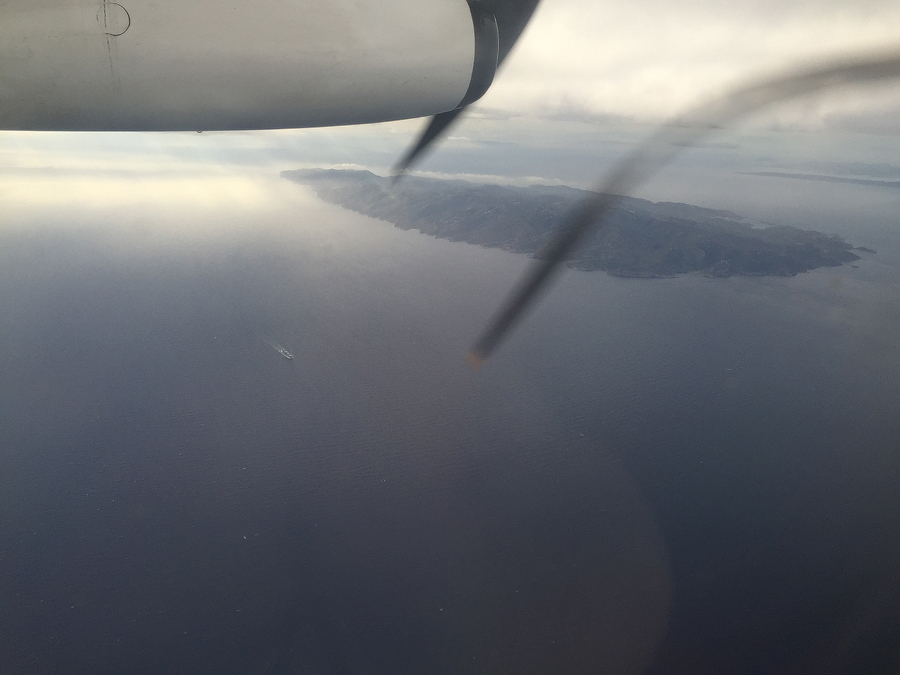‘…fieldwork is often an attempt by the researcher to resolve his own, very personal problems, rather than an attempt to understand other cultures.’
Nigel Barley, Not A Dangerous Sport
‘When did you stop asking for the window seat?’
This was the clever question posed some years ago by an advertisement for an airline, the identity of which has long-since faded from my mind. For most people, especially business travellers, flying has not just lost its glamour; it has become as mundane as taking a bus to work, with the added hassle of endless queues for bag drop, passport control and security.
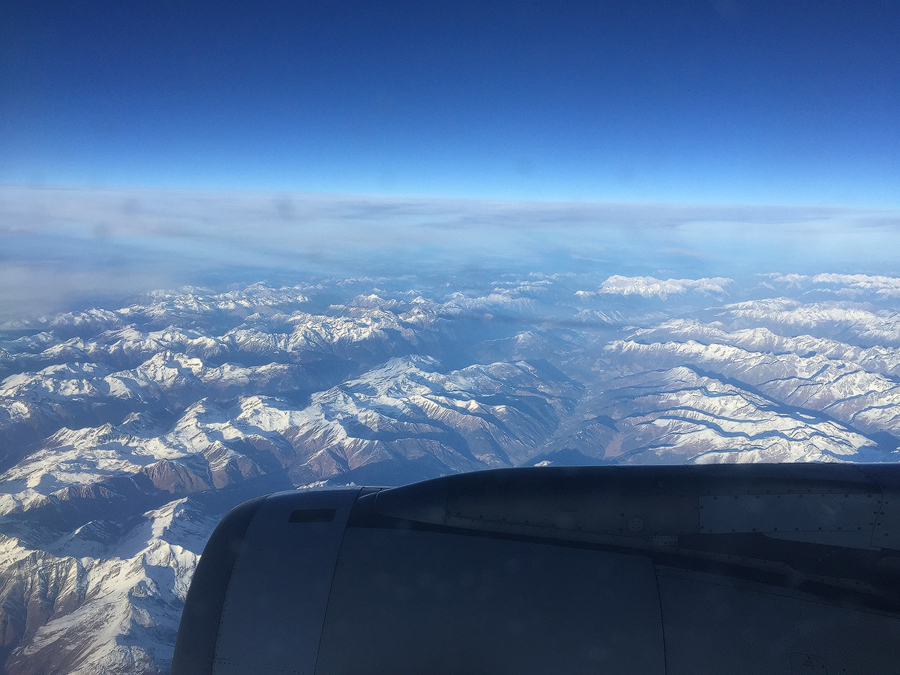
I never stopped asking for the window seat. As it happens, I’m sitting in 15F as I write these words, glancing regularly out of the window at the mountains of Albania sliding beneath the aircraft. At this time of year they should be snow-covered but only the lightest dusting is visible, on the highest peaks (even the Alps, a few minutes back, were mostly brown). Lake Ohrid’s turquoise waters are below us now, the surrounding hills reflected in its limpid surface. To the north-west, I can still make out the outlines of the islands off Croatia’s Adriatic coast, the seas surrounding them shrouded in low cloud.
How is it possible to take all this for granted? I woke up at 5am this morning in south-east London and, with a little bit of luck, I’ll be having lunch in Athens. Over the last three months, I’ve taken dozens of flights and I hope that I’ll be taking even more in the months to come. Although I understand aerodynamics, each one has felt to me like a minor miracle. Walking on water must have seemed a pretty neat trick when god cooked it up for the delectation of a bunch of credulous fishermen but, look daddy, now we can fly!
Some airlines, to be sure, are doing everything in their power to strip air travel of any shreds of romance that cling to it. I do everything I can to avoid flying with the revolting easyJet or the loathsome Ryanair (whether loathsome is worse than revolting or vice-versa depends on which of these two despicable companies I have most recently been in contact). Their flights invariably either depart or arrive at the least convenient times, from the most obscure airports, so that the airline can take advantage of the cheapest landing and take-off slots. The basic ticket price excludes a luggage allowance, which should be as illegal for airlines as it is for train and bus operators. You have to pay extra to be at the front of the scrum to cram yourself into a seat apparently designed for Tolkein’s most stunted characters. Ryanair even hides the option to decline its redundant travel insurance policy, burying the ‘opt out’ in an unrelated list of countries. The arbitrary limit on the size of one’s cabin baggage is enforced with an iron fist. ‘Sweetheart, you knew the rules,’ said one unsympathetic man to his spouse, as the unsmiling easyJet flight attendant extorted £30 from her for being half a centimetre too large. People will vote for their own enslavement, if you let them.
Caveat emptor, you might well say and I sort-of agree. I hand over money to ‘low fare’ airlines only when the alternative would be absurdly contrarian. Unfortunately, Emirates doesn’t fly to Greece or Turkey, direct from London. My one flight with this paragon among airlines was so delightful that I am almost tempted to take a beach holiday in the hyper-real, Disney nation of Dubai, just to experience it again. Feeling in need of a third, child-sized bottle of aeroplane wine, I pressed the call bell. Almost immediately, a smiling cabin attendant (one of 16, speaking 14 languages between them) appeared, bearing an open bottle on a tray. ‘Another glass of red wine, Dr Mitchell?’ she asked. This was, I hasten to add, in cattle class and it was a glass, not a flimsy plastic beaker. It takes the national airline of an Islamic country to know how to treat a travelling alcoholic. One day, I hope to discover what they do for the passengers up front.
I survived Christmas by adopting the mental attitude of a penguin in the Antarctic winter. With each passing year I find it harder to tolerate the lies we tell one another about this festival of consumerism. As I watched my young children disembowel extravagant gift after extravagant gift, discarding the wrappings like the glistening entrails of an unfortunate rodent at a Roman orgy, it occurred to me, not for the first time, that Christmas is a meme even more virulent than the Facebook bleep. If you have kids, and you don’t want them to hate you, you can’t opt out or even affect cynicism, both of which are still possible, just, with social media. Any attempt to suggest that Christmas is the ultimate zugzwang is drowned out by a chorus of bah! humbug from people whose brains have been so corrupted by the virus that they have become to Christmas as the whore of Babylon was to the pox or daesh is to the caliphate – empty vessels for conveying the disease from one mind to another. Syphilis can be treated (perhaps not for long, if the government’s Chief Nanny is to be believed) but there is no cure for Christmas.
My family were planning to be in the Netherlands for new year – another manufactured date that it has become mandatory to celebrate, on pain of being considered an outcast. There are limits to my willingness to kowtow to stupid conventions, however, and I had arranged to be as far as possible from anything resembling a party during late December and early January. As the aphorism quoted at the top of this post makes clear, fieldwork is rarely about studying anything and often about the urgent need to be elsewhere.
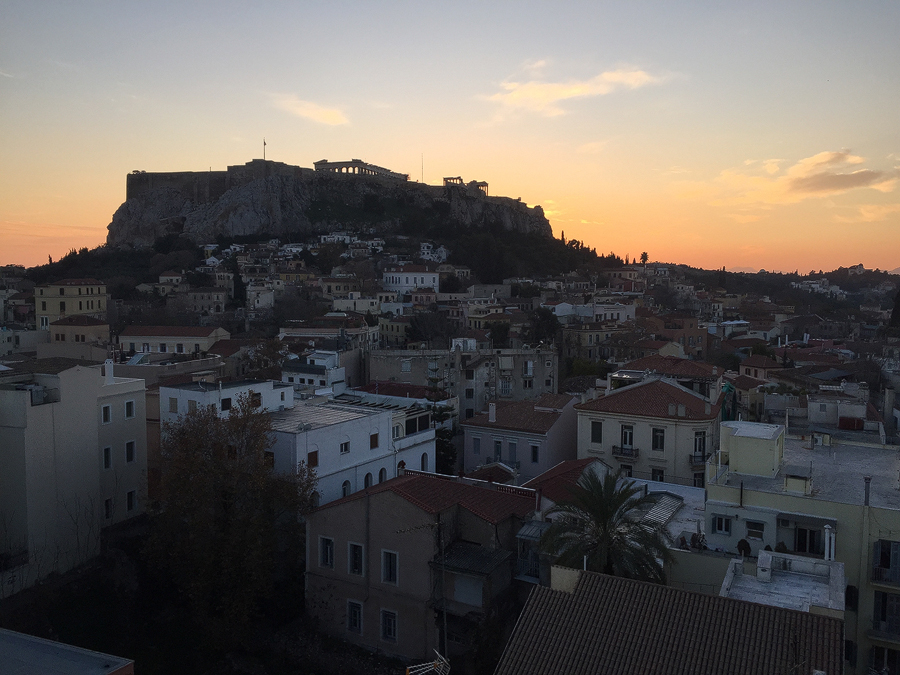
My flight landed in Athens, early in the afternoon of a day of crystalline blue skies. I had read, probably in an inflight magazine, that the restaurant at Athens’ new Acropolis Museum was excellent. It’s not, of course. The grub isn’t bad, in principle, but mine arrived lukewarm, a long time after I’d ordered it. The service is execrable but the view of the scaffolding permanently enveloping the Parthenon is unmatched. The Acropolis Museum must be the only place in the world defined by what it doesn’t contain, the extraordinary Parthenon friezes half-inched by Lord Elgin at a time when Greece didn’t give a stuff about them. They reside now in a dingy gallery in the British Museum. If you ask me, they ought to go back to Athens, to be displayed in the gorgeous glass and concrete space prepared for them, within sight of the world’s most famous limestone rock.
I dined on braised baby goat at a buzzing restaurant, not far from Syntagma Square. Actually, judging by the size and softness of the bones, I’m not entirely convinced that the animal was ex utero when slaughtered. It was very tender.

Early the following morning, I took a taxi to the port of Rafina and a ferry to Andros, the most northerly major island in the Cyclades. I’d arranged to hire an off-road vehicle, as many of the more interesting tracks on Andros are unmetalled. The car turned out to be a Fiat Panda with bald tyres and a knackered clutch. It boasted a switch by the steering wheel that caused a green 4WD symbol to appear on the dashboard but had no effect whatsoever on either torque or traction, as I discovered the following day, while rounding a sharp bend on the coast road near Batsi. The tyres lost their tenuous grip on the tarmac and the car did two graceful pirouettes, spinning like a boomerang around the corner and coming to rest, with the engine still running, about half a metre away from the nearest solid object, a large apartment building. One life down, eight to go.
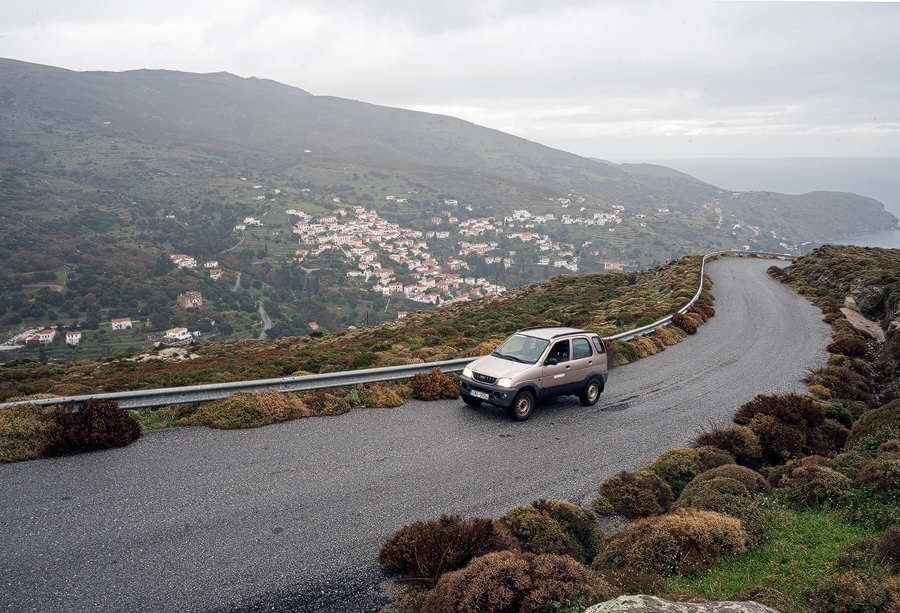
A series of parallel ridges traverse Andros, roughly from SW to NE. The central ridge is the highest, peaking at 997m. An appealing road crosses the island, passing through several pretty villages and running just below the ridge for part of its length. Without wishing to seem rude, I have to report that Andros looks just like Wales. The outlines of the hills are rounded and the vegetation, though comprised of typically Mediterranean garrigue plants like Broom and Pistacia lentisca, could just as well be bracken and bilberry, when viewed from a distance.
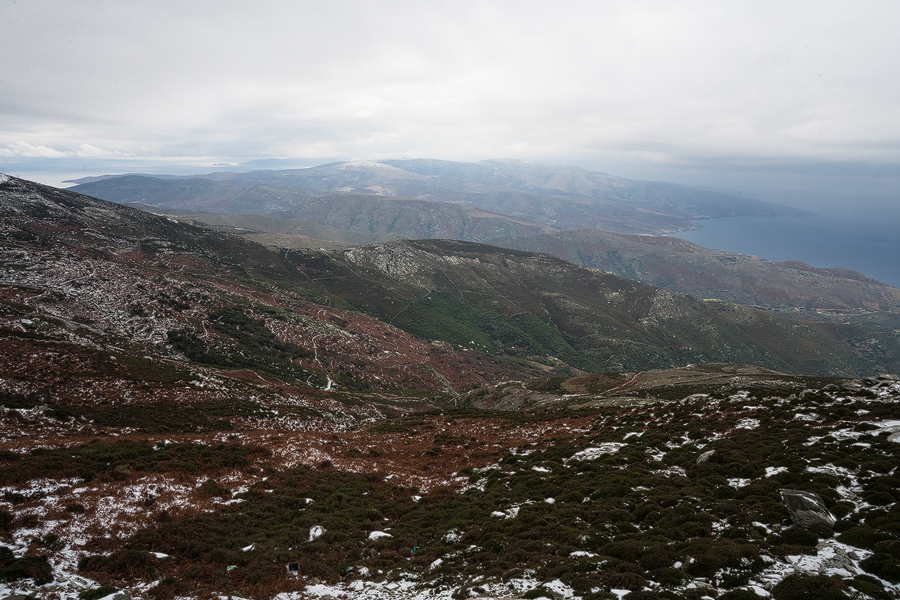
Everywhere on Andros are walls constructed from the local stone in a distinctive style. Big slabs of the blue-grey schist are set on edge, their flat faces parallel to the run of the wall. Between adjacent slabs, smaller pieces of stone are built up in the conventional way, as in a dry stone wall. The results are works of art but often seem to serve no purpose, running across barren hillsides or at the base of cliffs. Presumably, in former times, they enclosed livestock or marked the boundary between adjacent fiefdoms. The labour involved in their construction boggles a contemporary, leisure-softened mind.
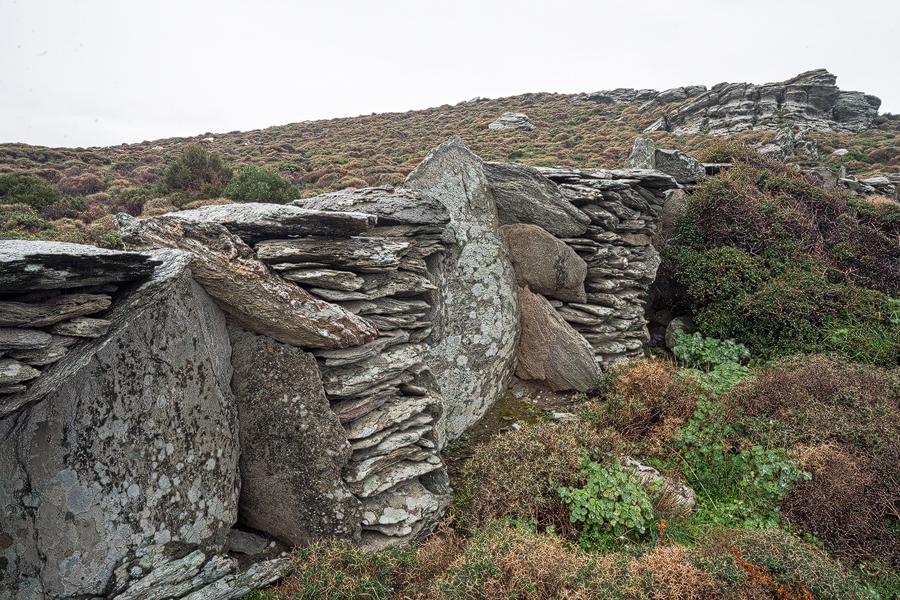
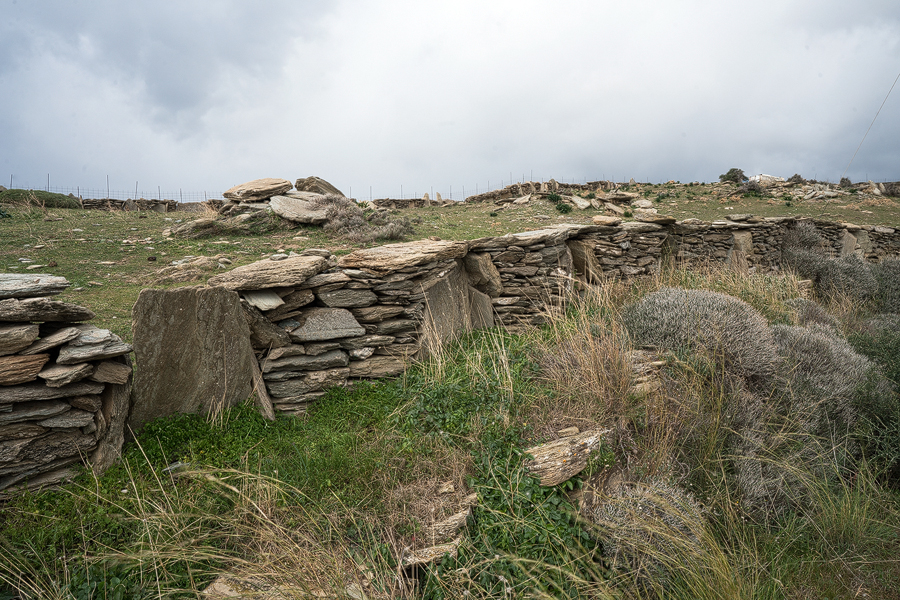
Often when I travel, I regret accepting the well-meaning advice of a university tutor who persuaded me to take a course in chemistry, from which I learned nothing, instead of an introduction to geology, which I would have found profoundly interesting. I am trying to teach myself basic field geology, so that I can interpret the rocks and the landforms of the places I visit. But it’s an uphill struggle. All scientific guilds use jargon to demonstrate their seriousness and to exclude non-initiates. Geologists have taken this practice to such absurd lengths that it is impossible to read an academic paper in the subject without stopping every two or three words to look something up. Much of the vocabulary is German, and so exuberantly polysyllabic that one often loses the will to live before getting to the end of the word. Even after transliteration, the meaning of a passage is often vague or downright AWOL. One is unpleasantly reminded of postmodernist French philosophy, via a nagging suspicion that the author can’t remember quite where she was going with this sentence, by the time it’s approaching a conclusion, so just writes any old thing. Geologists have something interesting to write about but I do wish they’d do so intelligibly.
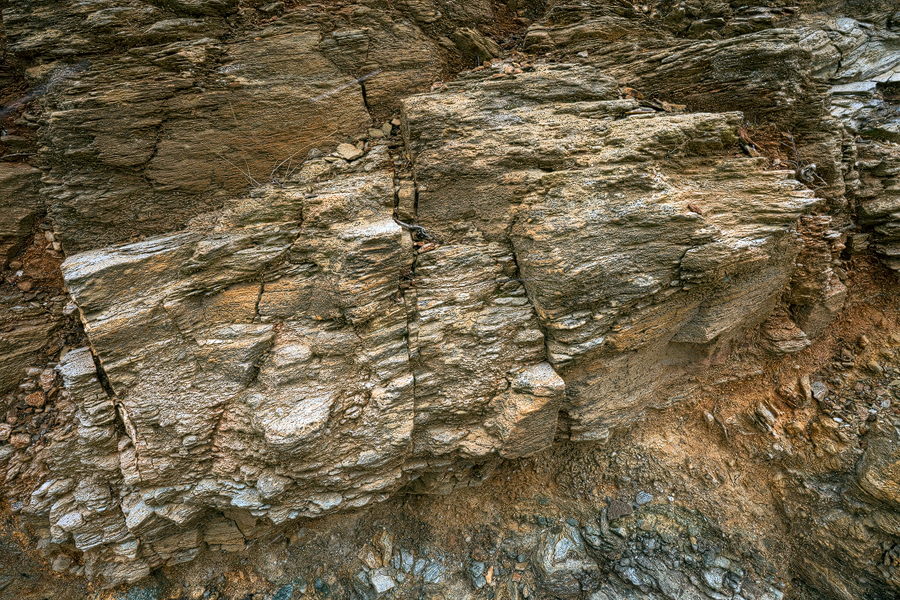
Anyway, as I understand it, the Cyclades came into being rather recently, in geological terms, being composed of metamorphic rocks only about 30 million years old. Africa is moving slowly northwards and, where the plate on which it sits meets the European plates, it slips beneath them. As the rocks of the African plate slide deeper into the earth’s mantle, they are cooked – metamorphosed – at ever higher pressures and temperatures. Some of these rocks, now transformed into schists, granodiorite and marble, were subsequently exhumed in the geological processes that formed the Aegean Sea.
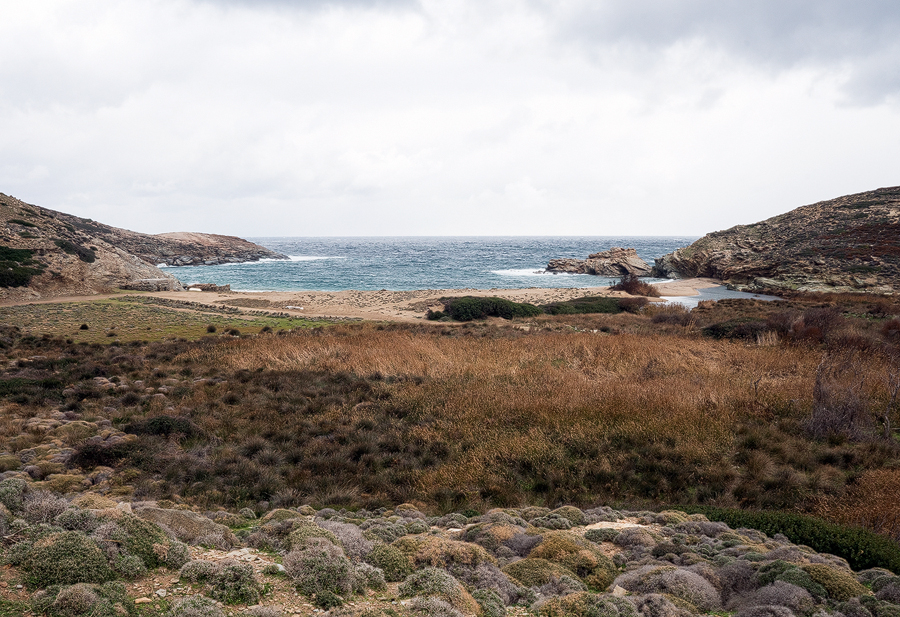
On Andros, the rocks are almost all schists, which lie in thin, easily weathered layers, like the shales of Wales, and it is these that give the island its characteristic rolling landscapes, with few jagged edges.
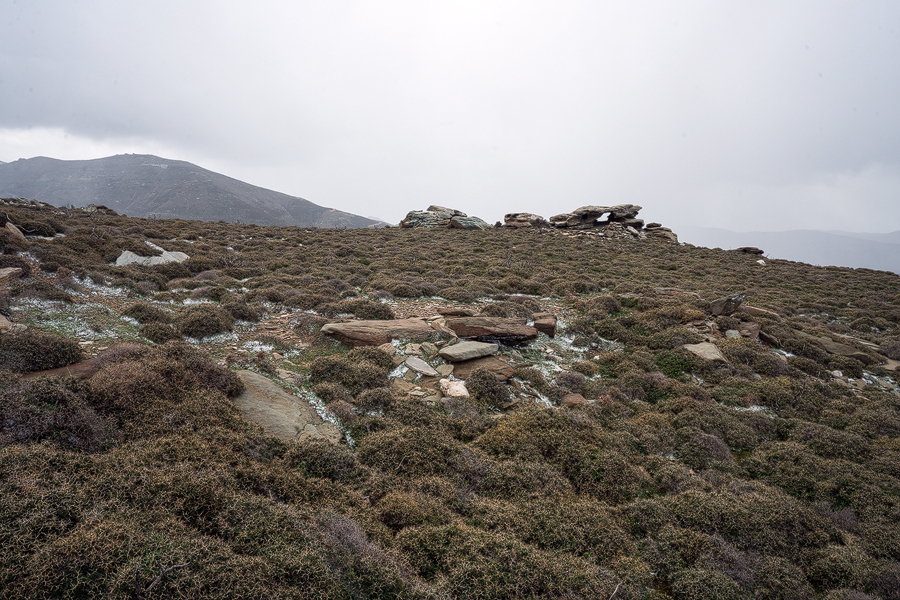
The island is abundantly supplied with fresh water and, in the deeper valleys, Plane Trees, deciduous oaks and maples create a deep shade in which snowdrops and other woodland plants thrive.
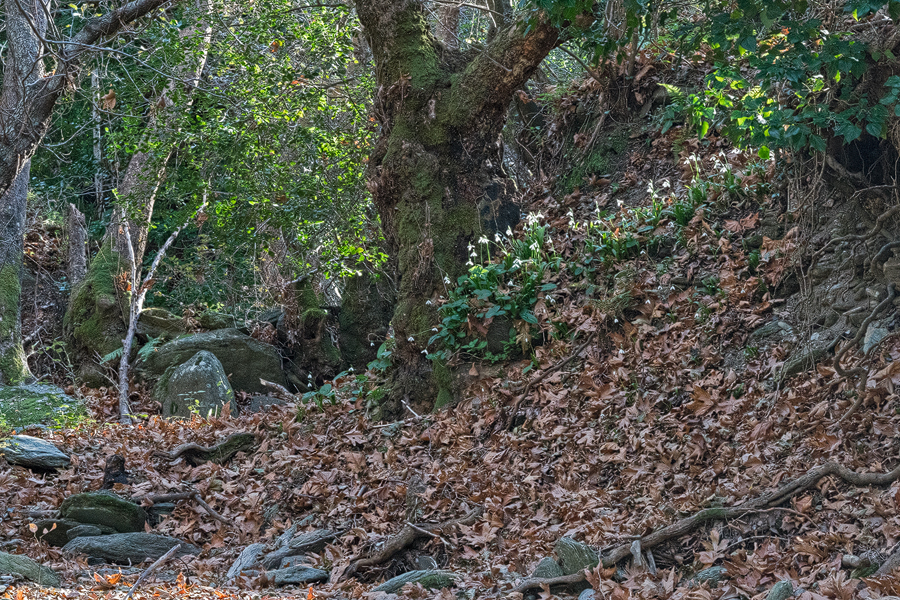
Around villages the steep slopes have typically been terraced and are planted with olives, citrus and vegetables but no vines. So far as I could tell, there are no vineyards on Andros, presumably because the soil is unsuitable.
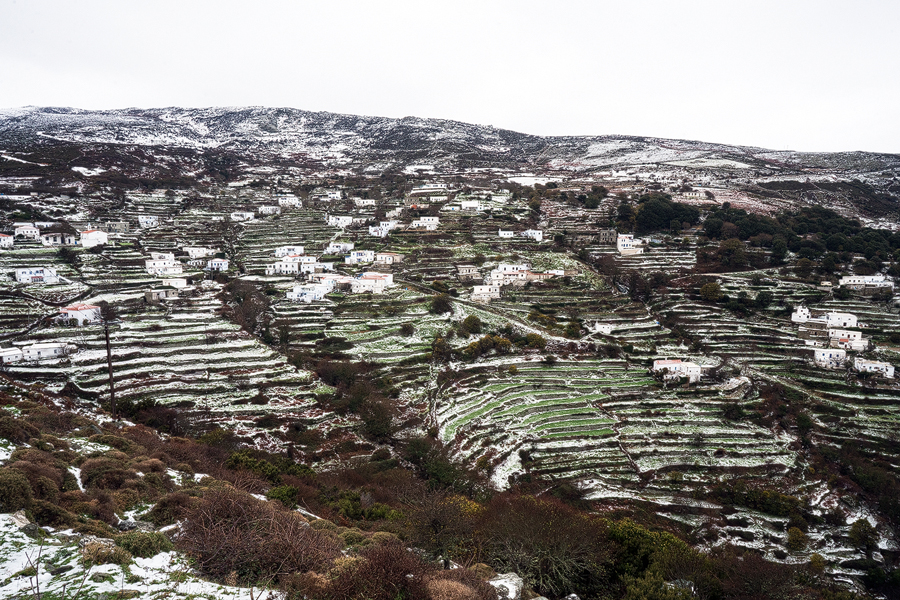
In winter the ferries between adjacent islands are relatively few and, in order to get to my next destination, Naxos, it was necessary to return to Athens, spend a night there, and take another ferry, this time from the main port of Piraeus. As the boat slipped into the small harbour of Gavrio, a magnificent marble arch, part of an ancient, unfinished temple to Apollo, was prominent on an islet offshore.
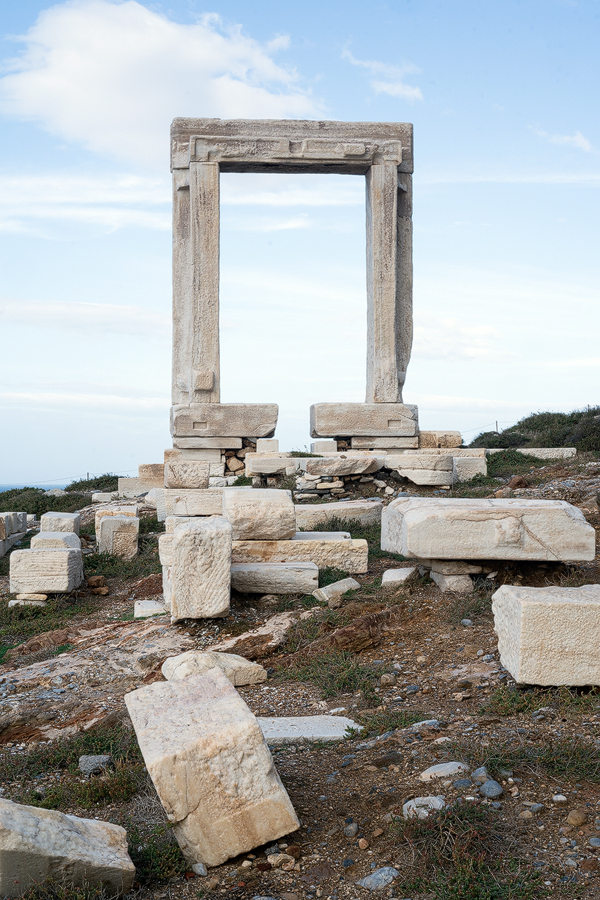
Naxos is composed of a complex mix of marble and schist, with smaller quantities of other metamorphic rocks, and this gives the island a quite different character to Andros. The terrain is more rugged, the outlines of the mountains less rolling and the scenery altogether more beautiful.
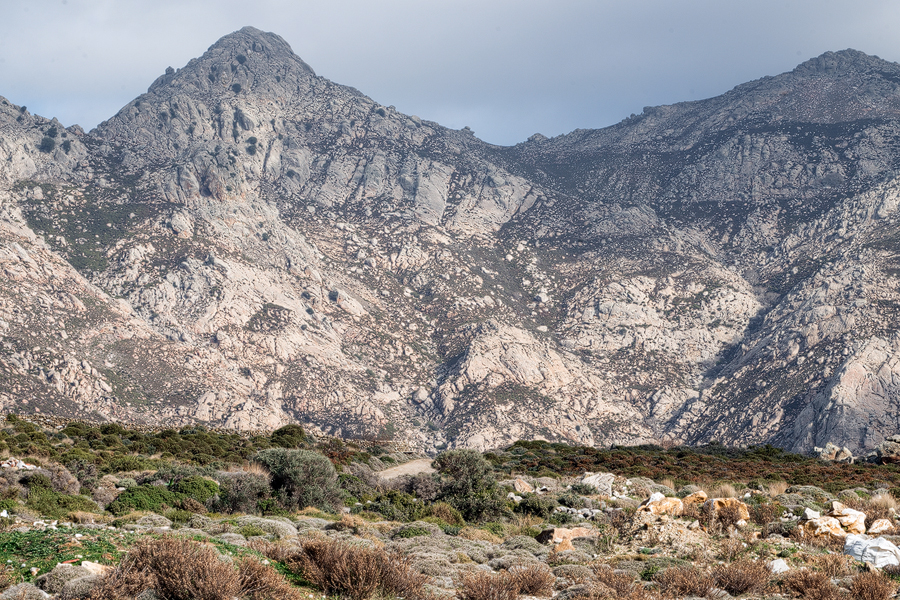
Snow had fallen while I was on Andros, but not much, and it had evidently been deeper on Naxos. By the time I arrived, however, the weather had warmed up considerably and almost all the snow had gone, except from the peaks.
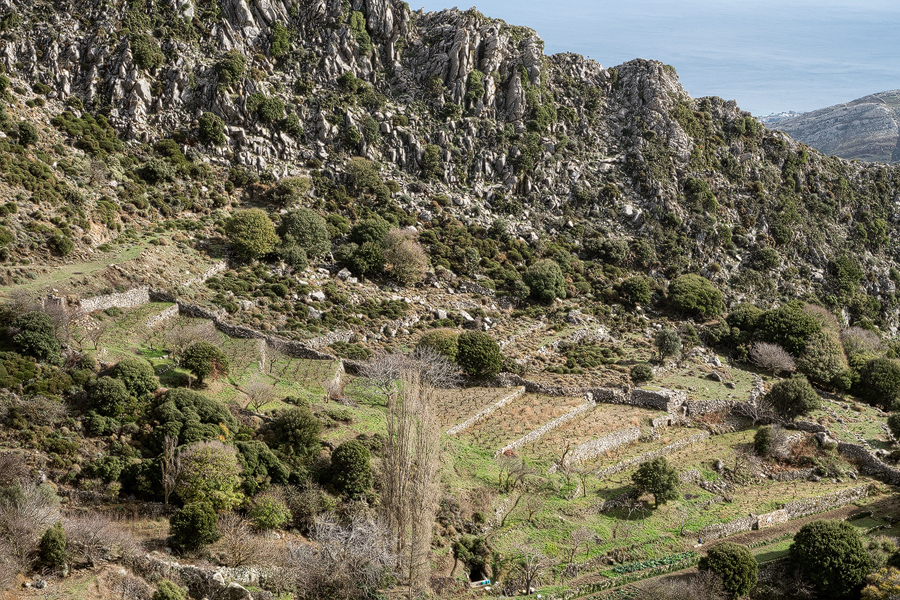
Mount Zas, the highest peak in the Cyclades, is one vast chunk of marble, from which a billion Parthenons could be excavated. Indeed marble quarries both abandoned and active are to be seen all over the island.
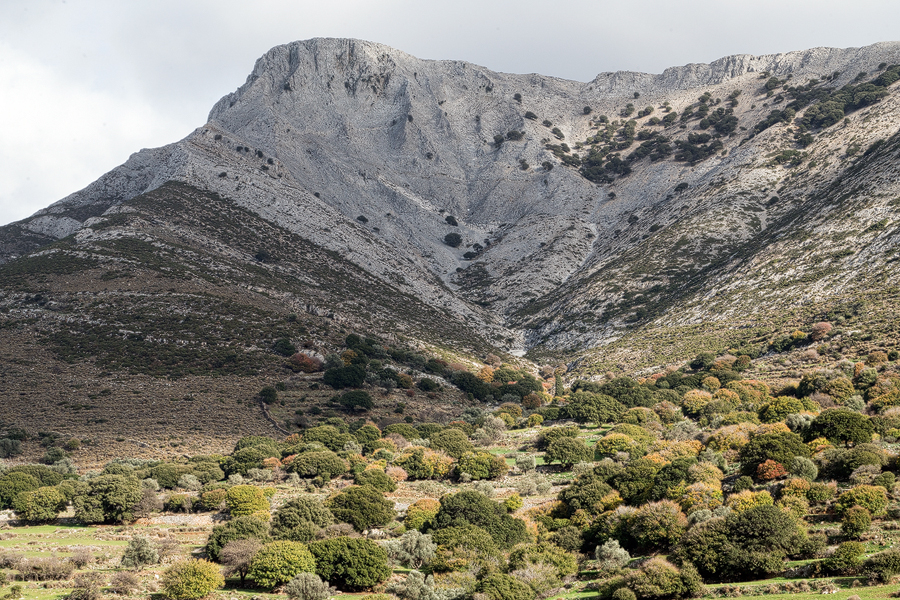
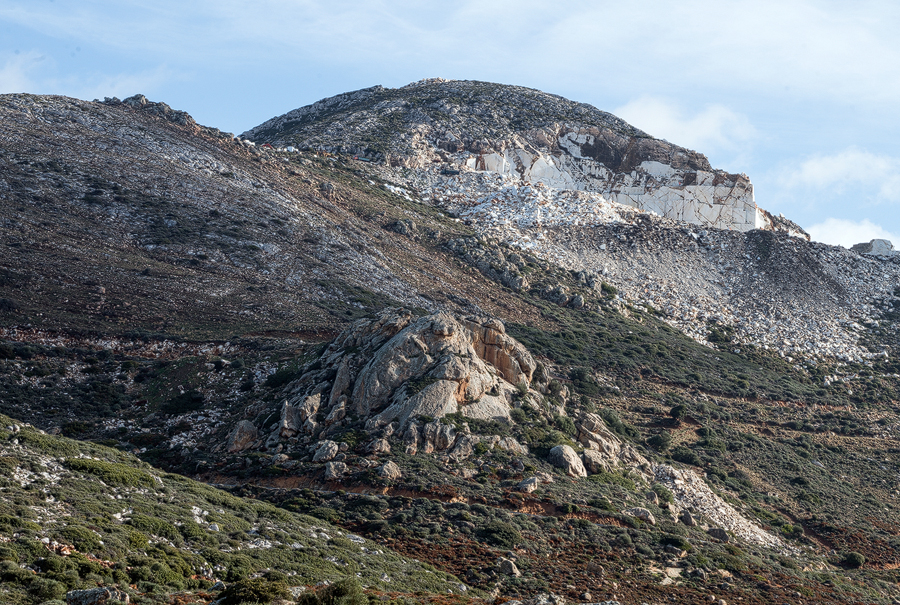
In places the marble and schist were interlayered and I was fascinated to see how the vegetation favoured the seams of more-easily weathered schist, unable presumably to gain a foothold in the hard, white marble.
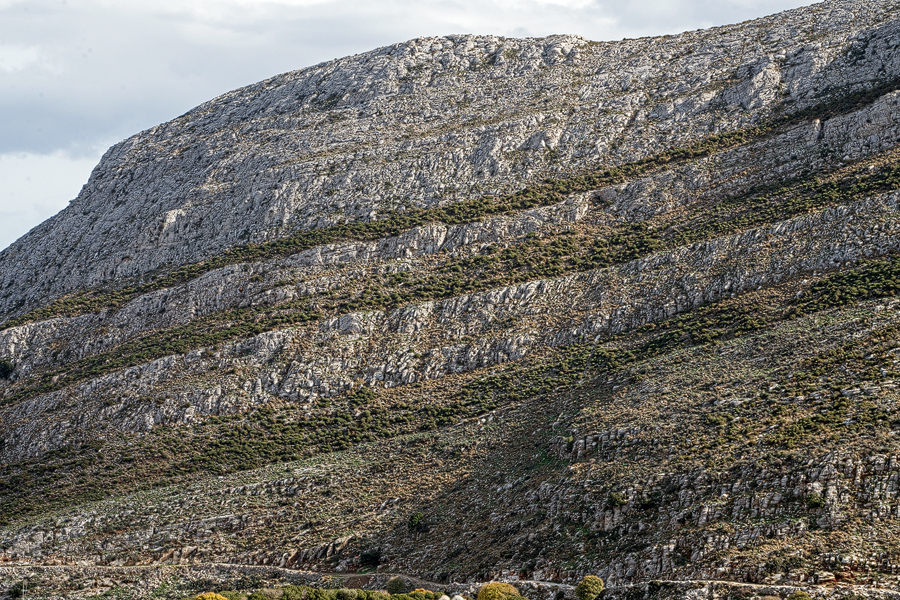
I’d elected to fly back to Athens, rather than take another ferry and the small plane flew low enough over the Cyclades that I could indulge in a bit of aerial snowdropping, trying to pick out the islands with valleys that looked as if they might be suitable for the little white-flowered plants that have become an obsession. This is a demon that will be exorcised only by ceaseless travel in snowdrop lands.
